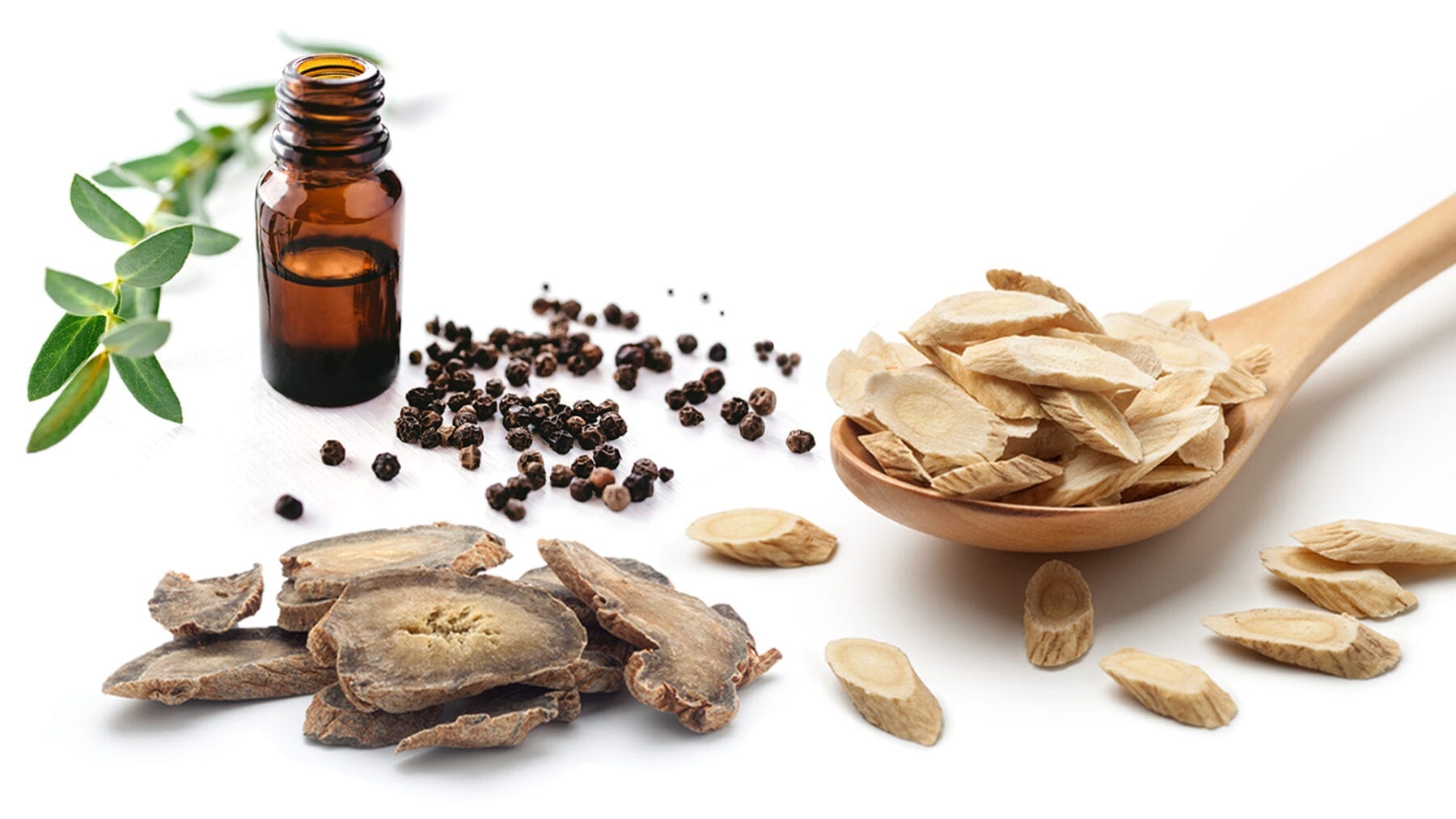
Written by Akeel Salahudeen
Final Year Medical Student
November 23, 2020
CATEGORIES
View All
BioWOW Foods® Safety/Quality
Full-Body Workouts
Healthy Eating
Joint Health
Self-Care Strategies
Supplements Guide
Featured Videos
What Is Ginger Root?
Ginger Root (Zingiber Officinale) is a small flowering plant originally grown in Southeast Asia and parts of China. The ginger root is also known as the rhizome. The rhizome it is an underground stem and used as a spice and in herbal medicine for centuries in India and other parts
of Asia.
A variety of compounds have been identified from the ginger root. Gingerols, which is a ketone, is the main constituent of fresh ginger root/rhizome. Shogoals are more abundant in dry ginger. Other compounds such as gingerenone, methoxy-gingerol, and paradol are also found in ginger root. The proportions of these compounds that are present in ginger vary according to the country of origin, and how
it is processed. [1]
How Does It Work?
The health benefits of Ginger root/rhizome are accredited to it’s anti-oxidant, anti-inflammatory compounds, such as gingerol.
Metabolic processes in the body generate free radicals as byproducts. Free radicals are neutralized and removed from the body by natural anti-oxidants. However, the body fails to remove excess free radicals and this leads to inflammatory conditions such as slow healing, slow recovery from infections, slow repair, arthritis, osteoarthritis, and even other chronic disorders such as diabetes, atherosclerosis, and hypertension.
How Does Ginger Root Benefit A Workout Routine?
1. Relieves Muscle Soreness
The body has a standard response to stress. One such stressor is intense exercise during a workout, a game of soccer, a game of tennis, or any other instense physical activity. There is an increasing interest in what is known as eccentric muscle exercise in bodybuilding. One of the most common side effects of an eccentric muscle workout, especially when performed by an unaccustomed individual on the first day is “delayed onset muscle soreness” (DOMS). DOMS begins one or two days after a workout, and it is due to muscle damage and healing. Although DOMS goes away in a few days, it can disturb a workout routine and affect daily activities. The anti-oxidant and anti-inflammatory properties of ginger root compounds play an important role here, by removing free radicals and improving healing. Many researchers have found evidence as to how the ginger root helps maintain muscle power and attenuates muscle pain. [8] Faster healing and less pain improves the recovery time between workouts.
2. Anti-inflammatory Properties
Ginger is a potent anti-inflammatory herb due to its anti-oxidant properties. The anti-oxidants neutralize and remove the excess free radicals that cause inflammation and damage to cells, tissues, and organs. Relief from inflammation due to excess anti-oxidant supplements can lead to natural healing of the body, including muscle repair after workouts and protecting the body from chronic diseases, including arthritis. [2]
3. Improves Digestion and Nausea
Gingerol contained in ginger root is known for improving gastric motility, enhancing the passage of food through the digestive tract, and suppressing muscle spasms. Optimal digestion improves indigestion and associated vomiting and nausea. Improved digestion promotes the increased dietary intake of nutrients necessary for healing and recovery after a workout. [3]
Other Benefits Of Ginger Root
1. Improves Osteoarthritis
Free radicals are produced as a result of metabolism. Free radicals are harmful to the body and they cause chronic inflammation, especially in places like the joints causing painful osteoarthritis. The body has built-in mechanisms of clearing out free radicals, which can be inadequate at times. Anti-oxidants, such as those present in ginger root, are capable of clearing out those excess free radicals and promote healing and protection from harmful free radicals. [5]
2. Eases Menstrual Pain
Ginger root can be used as a remedy for menstrual cramps. The compounds in ginger are known to suppress the production of chemicals that contract the uterus to relieve pain.
3. Regulates Blood Sugar
Ginger root is said to increase glucose uptake in cells improving glucose sensitivity, therefore controlling blood glucose levels. [4]
4. Cancer Prevention
Free radical accumulation is a known cause of cancer pathogenesis. The anti-cancer effects of gingerols, shogaols, and paradols involved in apoptosis, cell-cycle regulation, cytotoxic activity, and inhibition of angiogenesis are well documented. [6] [7]
At BioWOW, our mission is to help people live healthier & happier lives by creating industry-leading all-natural products and cutting-edge health content. Visit our online store for a complete list of our 100% standardized all-natural medically researched supplements for boosting your health.
References:
1.) Bode AM, Dong Z. The Amazing and Mighty Ginger. In: Benzie IFF, Wachtel-Galor S, editors. Herbal Medicine: Biomolecular and Clinical Aspects. 2nd edition. Boca Raton (FL): CRC Press/Taylor & Francis; 2011. Chapter 7. Available from: https://www.ncbi.nlm.nih.gov/books/NBK92775/
2.) https://pubmed.ncbi.nlm.nih.gov/11710709/
3.) https://europepmc.org/article/med/18403946
4.) https://www.ncbi.nlm.nih.gov/pmc/articles/PMC4277626/
5.) Altman RD, Marcussen KC. Effects of a ginger extract on knee pain in patients with osteoarthritis. Arthritis Rheum. 2001 Nov;44(11):2531-8. doi:10.1002/1529-0131(200111)44:11<2531::aid-art433>3.0.co;2-j. PMID: 11710709.
6.) Mashhadi, N. S., Ghiasvand, R., Askari, G., Hariri, M., Darvishi, L., & Mofid, M. R. (2013). Anti-oxidative and anti-inflammatory effects of ginger in health and physical activity: a review of current evidence. International journal of preventive medicine, 4(Suppl 1), S36–S42.
7.) Wang S, Zhang C, Yang G, Yang Y. Biological properties of 6-gingerol: a brief review. Nat Prod Commun. 2014 Jul;9(7):1027-30. PMID: 25230520.
8.) Dominguez-Balmaseda D, Diez-Vega I, Larrosa M, San Juan AF, Issaly N, Moreno-Pérez D, Burgos S, Sillero-Quintana M, Gonzalez C, Bas A, Roller M, Pérez-Ruiz M. Effect of a Blend of Zingiber officinale Roscoe and Bixa Orellana L. Herbal Supplement on the Recovery of Delayed-Onset Muscle Soreness Induced by Unaccustomed Eccentric Resistance Training: A Randomized, Triple-Blind, Placebo-Controlled Trial. Front Physiol. 2020 Jul 21;11:826. doi: 10.3389/
fphys.2020.00826. PMID: 32848820; PMCID: PMC7396658.
9.) Black CD, Herring MP, Hurley DJ, O’Connor PJ. Ginger (Zingiber officinale) reduces muscle pain caused by eccentric exercise. J Pain. 2010 Sep;11(9):894-903. doi: 10.1016/j.jpain.2009.12.013. Epub 2010 Apr 24. PMID: 20418184.
3 QUICK AND HEALTHY SNACKS

Written by Dr. Sapumal Edirisinghe
Bachelor of Medicine / Surgery (MBBS)



